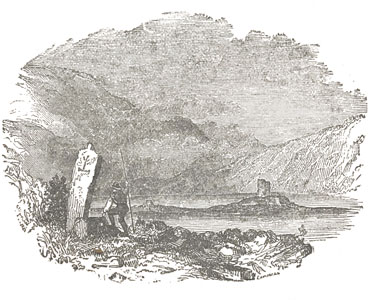Boromean Tribute
Tuathal was the son of a former legitimate monarch, and had been invited to Ireland by a powerful party. He was perpetually at war with the Attacotti, but at last established himself firmly on the throne, by exacting an oath from the people, "by the sun, moon, and elements," that his posterity should not be deprived of the sovereignty. This oath was taken at Tara, where he had convened a general assembly, as had been customary with his predecessors at the commencement of each reign; but it was held by him with more than usual state. His next act was to take a small portion of land from each of the four provinces, forming what is now the present county of Meath, and retaining it as the mensal portion of the Ard-Righ, or supreme monarch. On each of these portions he erected a palace for the king of every province, details of which will be given when we come to that period of our history which refers to the destruction of Tara. Tuathal had at this time two beautiful and marriageable daughters, named Fithir and Dairiné. Eochaidh Aincheann, King of Leinster, sought and obtained the hand of the younger daughter, Dairiné, and after her nuptials carried her to his palace at Naas, in Leinster. Some time after, his people pursuaded him that he had made a bad selection, and that the elder was the better of the two sisters; upon which Eochaidh determined by stratagem to obtain the other daughter also. For this purpose he shut the young queen up in a secret apartment of his palace, and gave out a report that she was dead. He then repaired, apparently in great grief, to Tara, informed the monarch that his daughter was dead, and demanded her sister in marriage. Tuathal gave his consent, and the false king returned home with his new bride. Soon after her arrival at Naas, her sister escaped from her confinement, and suddenly and unexpectedly encountered the prince and Fithir. In a moment she divined the truth, and had the additional anguish of seeing her sister, who was struck with horror and shame, fall dead before her face. The death of the unhappy princess, and the treachery of her husband, was too much for the young queen; she returned to her solitary chamber, and in a very short time died of a broken heart.
The insult offered to his daughters, and their untimely death, roused the indignation of the pagan monarch, and was soon bitterly avenged. At the head of a powerful force, he burned and ravaged Leinster to its utmost boundary, and then compelled its humbled and terror-stricken people to bind themselves and their descendants lor ever to the payment of a triennial tribute to the monarch of Erinn, which, from the great number of cows exacted by it, obtained the name of the "Boromean Tribute"—bo being the Gaedhilic for a cow.
The tribute is thus described in the old annals:
"The men of Leinster were obliged to pay
To Tuathal, and all the monarchs after him,
Three-score hundred of the fairest cows,
And three-score hundred ounces of pure silver,
And three-score hundred mantles richly woven,
And three-score hundred of the fattest hogs,
And three-score hundred of the largest sheep,
And three-score hundred cauldrons strong and polished."[1]
It is elsewhere described as consisting of five thousand ounces of silver, five thousand mantles, five thousand fat cows, five thousand fat hogs, five thousand wethers, and five thousand vessels of brass or bronze for the king's laving, with men and maidens for his service.
The levying of the tribute was the cause of periodical and sanguinary wars, from the time of Tuathal until the reign of Finnachta the Festive. About the year 680 it was abolished by him, at the entreaty of St. Moling, of Tigh Moling (now St. Mullen's, in the county Carlow). It is said by Keating, that he availed himself of a pious ruse for this purpose,—asking the king to pledge himself not to exact the tribute until after Monday, and then, when his request was complied with, declaring that the Monday he intended was the Monday after Doomsday. The tribute was again revived and levied by Brian, the son of Cinneidigh, at the beginning of the eleventh century, as a punishment on the Leinster men for their adherence to the Danish cause. It was from this circumstance that Brian obtained the surname of Boroimhé.

Lough Hyne
Notes
[1] Polished.—Keating, p. 264.
